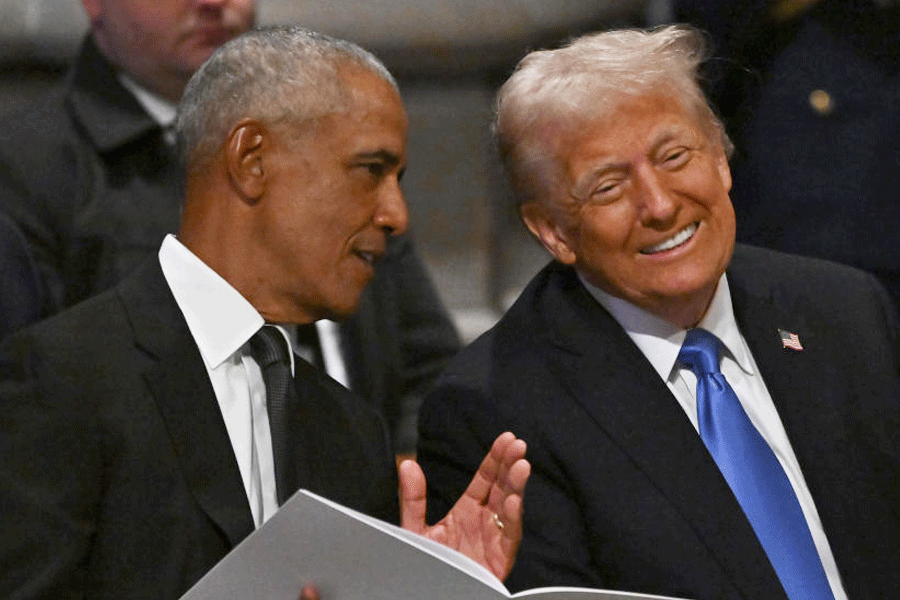.jpg)
The thing about interviewing politicians is that you can prod and provoke them into giving you great headlines. But when it is a bureaucrat or a diplomat, you tend to keep those expectations on a leash. Then again, there are days when you don't care about such things, you just listen.
This is one such day. I am meeting former foreign secretary Shyam Saran at the India International Centre (IIC), a favourite haunt of Delhi's intellectual elite. We are in the boardroom on the first floor, at one end of an oblong table. Saran is telling me, "Diplomacy is possible and successful only when it is able to operate in some grey areas. You cannot see it as black or white." Previous IIC presidents are listening in on our conversation from their glassy frames on the walls.
Saran, 71, is in a dark blue kurta and white pyjama. It's been a day of long interviews, all in connection with his new book, How India Sees the World: Kautilya to the 21st Century. Saran is an old China hand. His book takes a close look at Indian history, culture, religion and politics and, of course, China. It presents the legacy of Indian foreign policy in benign light.
Saran has his sleeves rolled up. He is unravelling complex policies in his calm, unhurried manner. His hands are chattier, breaking into animated gesticulations for every sentence he utters. We dive into the Doklam stand-off almost immediately.
It would be incorrect to term Doklam a "minor incident", he says. "The level of rhetoric from the Chinese side was elevated and harsh, a departure from the past. It was also different in that it was a stand-off in a third country. We had to keep in mind the interests of a very friendly neighbour like Bhutan."
With the practised ease of a surgeon, Saran cuts through layers of onerous policy and lays bare the possible reasons behind the Chinese reaction. Doklam, most likely, didn't go according to China's script. "For the Chinese side, it had been a normal pattern of behaviour as in the South China Sea or elsewhere. In a sense, they incrementally advanced there with no resistance. At Doklam, they were engaged in making a dirt track, then broadening the dirt track and increasing the patrols. They wouldn't have expected an Indian reaction to this incremental presence, that too in Bhutanese territory."
Saran gives high marks to India for the way it handled the situation, the fact that India didn't react in the same language the Chinese used. "That we kept a door open for an amicable resolution of the problem was a sign of good diplomacy. It was reasonable to say that the best way to solve the problem was to maintain status quo."
Some have claimed that the Modi government has proved to be a hard nut to crack for China on Doklam. Saran, however, doesn't agree with this one. "Even previous governments tried to emphasise that there were points of convergence and we should leverage those points and confront China in areas where our interests are being threatened. This government too did just that."
China's reaction to the resolution, according to Saran, has been predictable. It has projected the de-escalation as the result of unilateral withdrawal of Indian forces, rather than a mutual disengagement. "A closer reading of the official Chinese statement, however, acknowledges that Chinese forces will be making adjustments to their positions and that road building activities are being suspended for the present but could be resumed when weather conditions improve."
There is no time to relax though, Saran reminds. There could be more such incidents in the future to increase the pressure on India. It is better to be prepared.
Part of being prepared involves being aware of what the other country is all about and how it perceives India. Saran does not seem happy with India's understanding of China. "In the Indian case, war is seen as a last resort, whereas for the Chinese, it [use of force] is seen as a useful tool and in a way, an extension of talks. It is incumbent that India tries and understands the other side rather than talk about betrayal all the time.
"In many cases you are not able to understand the idiom which is being used on the other side," he adds, referring to the run-up to the 1962 war when China had dropped enough hints about what it was up to.
Saran stresses that the way to go about it is not by having a few people in the external affairs ministry who know the Chinese language and are familiar with China. There must be people who really, deeply, understand China. "People who are able to make the right kind of inputs for policymakers. If there is no overall understanding of a country, we may falter."
Invoking the legendary strategist from his book title, he stresses that India needs to be more Kautilya-like in its approach and build strong alliances with countries such as Japan, Australia and the US, none of whom is comfortable with a growing and assertive China. At the same time, it should maintain its "strategic autonomy", the pivot of Indian foreign policy since Independence. The very strategic autonomy that was pursued by Nehru through the non-alignment policy, and maintained even when India switched to a "multi-alignment" arrangement.
In recent years, many foreign policy experts have poured scorn on the non-alignment policy of India - a position of not being formally aligned with or against any major power bloc - and traced all ills related to India's foreign engagement to it, but not Saran. He says, "They don't understand history and nobody goes deeper into the wellsprings of that policy. Nehru explained to India as to why he crafted that policy. Whether we acknowledge Nehru or not, it is his template that we are following to this day."
We get talking about how Nehru is also blamed for the festering Pakistan problem. Saran says India has been boxing itself into a corner when it comes to Pakistan. "We have fallen into a pattern of disruption and dialogue, disruption and dialogue. This cannot go on."
The Kautilya way is key here too, apparently. Saran is in favour of working the "pressure points" against Pakistan, but at the same time he is all for continuing talks.
During his tenure as the foreign secretary from 2004 to 2006, the ministry issued statements on the restive province of Balochistan and also started meeting delegations from Gilgit-Baltistan from Pakistan-occupied Kashmir. All against the backdrop of ceaseless talks.
"Pakistan has to be aware that it has a price to pay if it follows policies that will be inimical or hostile to India. But at the same time, we have to talk to them, have more trade relations, and people-to-people contacts should increase. In actual fact, we haven't developed the levers that we can exercise. Making noise doesn't solve the problem."
India's relations with the US pose another challenge, especially with Donald Trump in the hot seat. Saran says, "What we are facing is a political leadership that is quite unpredictable. There is uncertainty about what is going to be the role of the US. It is a superpower and it cannot be transactional in its relations with the outside world."
There is a China angle to this as well. China senses that the US retreat in many areas under Trump means it has a greater room for itself, points out Saran. "It has made our foreign policy that much more complex," he adds.
Within India, he says, he is disturbed by the "narrow, nationalist kind of tendencies". "Successful societies will be those that are able to handle diversity. India throughout history has been a crossroads culture. We have dealt with many influences but we have been assimilative and have enriched ourselves while retaining our identity. I see our diversity as an asset."
Diversity brings us to Saran's other passion - advocating policies on environment and climate change. He is very clear that our planet is facing an ecological emergency. An avid trekker, he says he can see the effects of climate change in the mountains. "Over the years, at least anecdotally, I see that glaciers are receding, snow cover has reduced and the snowline has moved back in many areas."
On climate change, he sees a leadership role for India though he admits in the same breath part of that is wishful. He talks about India's cultural tradi-tion of looking upon nature as a source of nurture rather than as a dark force that needs to be conquered. But he is well aware of India's limited scope. "When you contribute less than 2 per cent to global trade, it is unrealistic to believe that you will have a major say in multilateral regimes."
The secret sauce for a bigger profile at the world level is a rocketing economy. "During 2004-06 we were growing at a rate of 8-9 per cent. International perception was that we were the next China. And the world listened to us. If we don't grow and the world perception is that we may never catch up with China, our room for diplomatic manoeuvre becomes that much less." Tough, at the moment, to take the attention of Indian mandarins away from China.
tetevitae
1970: Saran joins the Indian Foreign Service and in his 34-year-long career he holds several key positions
Between 1992 and 2002, heads Indian missions in Mauritius, Myanmar and Indonesia. Thereafter, takes over as India's ambassador to Nepal
Among other things, also heads the East Asia Division of the ministry of external affairs, which handles relations with China and Japan. Said to be fluent in Mandarin
1991-92: Part of Narasimha Rao's PMO as joint secretary and China expert, and in 2004 is appointed foreign secretary by the UPA government
2006: Retires and eventually assumes the post of the PM's special envoy on Indo-US civil nuclear issues as well as on climate change
2010: Exits Manmohan Singh's PMO soon after the Copenhagen climate summit following whispered differences with the then environment minister, Jairam Ramesh
2011: Is awarded the Padma Bhushan

.jpg)








